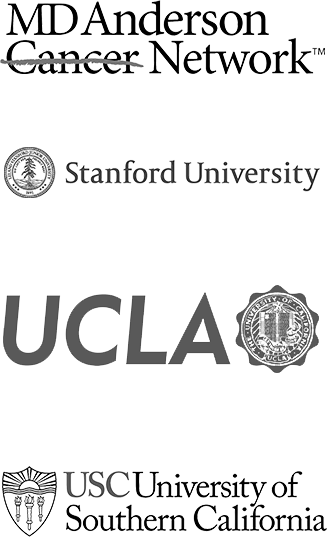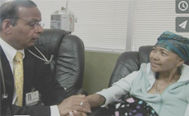Brain Tumors
Brain and spinal cord tumors are formed through the growth of abnormal cells in the tissue and while these tumors typically do not metastasize to other parts of the body, they can spread throughout the brain and spinal cord making them difficult to remove completely. Even tumors classified as “benign” when allowed to grow can press on and harm normal brain tissue and cause pain.
Brain tumors can also form when a tumor from another part of the body has metastasized into the brain. These are metastatic brain tumors (or brain metastases), which are more common than primary brain tumors.

Brain and Spinal Cord Tumors Overview
Most brain and spinal cord tumors develop from glial cells, which are the supporting cells of the brain. These tumors account for approximately 38% of primary brain tumors:
- Anaplastic
- Astrocytoma
- Glioblastoma
There are a few less common primary tumors, which are (ranked according to occurrence):
- Pituitary tumors
- Schwannomas
- CNS lymphomas
- Oligodendrogliomas
- Ependymomas
- Low-grade astrocytomas
- Medulloblastomas
The best strategy for early diagnosis is prompt attention to the signs and symptoms of this disease as well as knowing family medical history.
 Our Los Angeles physicians specialize in cancer care from diagnosis to treatment and recovery with the belief that compassion and mutual respect are essential for success in all the dimensions of cancer care. Our physicians partner with each patient encouraging them to participate in their own medical care and helping them to make informed decisions.
Our Los Angeles physicians specialize in cancer care from diagnosis to treatment and recovery with the belief that compassion and mutual respect are essential for success in all the dimensions of cancer care. Our physicians partner with each patient encouraging them to participate in their own medical care and helping them to make informed decisions.
Symptoms
The main areas of the brain include the cerebrum, cerebellum, and brain stem and each has its own unique function. Brain cancer symptoms are determined by the location of the tumor within the tissue.
Cerebrum
The cerebrum is the brain’s large, outer portion that controls reasoning, thought, emotion, and language. It is also controls voluntary muscle movements (throwing a ball, walking, chewing, etc.) and for intaking and processing sensory information (vision, hearing, smell, touch, and pain).
A tumor in a cerebral hemisphere presents the following symptoms:
- Seizures
- Trouble speaking
- A change of mood such as depression
- A change in personality
- Weakness or paralysis in part of the body
- Changes in vision, hearing, or other senses
Basal Ganglia
The basal ganglia lies deep within the brain and controls involuntary muscle movement. A brain tumor here can cause symptoms of weakness and possibly tremors or other involuntary movements though these instances are rare.
Cerebellum
The cerebellum is in the back part of the brain under the cerebrum and coordinates body movement. Tumors in the cerebellum can cause problems with:
- Coordination in walking
- Fine motor movements of hands, arms, feet, and legs
- Swallowing
- Speech
- Synchronizing eye movements
Brain Stem
The brain stem is situated at the lower part of the brain and connects to the spinal cord. It consists of nerve fibers responsible for controlling muscles and sensation between the cerebrum and the rest of the body. It also helps control breathing and beating of the heart. The brain stem communicates with the cranial nerves that control the face, eyes, tongue, mouth, and other facial areas.
A brain stem tumor can manifest symptoms such as:
- Body weakness
- Stiff muscles or problems with sensation
- Facial or eye movement difficulty
- Problems hearing or swallowing
- Double vision
- Difficulty with walking
Surgical removal of tumors from this area is risky because this part of the brain is small and essential to life.
Spinal Cord
The spinal cord contains nerve fibers that control muscles, sensation, and bladder and bowel control. If a tumor develops along the spinal cord, symptoms are usually felt on both sides of the body (such as weakness or numbness of both legs not just one); this is unlike most brain tumors, which usually impact only one side of the body.
A tumor in the spinal cord causes symptoms of:
- Weakness
- Paralysis
- Numbness
Treatment
Tumors of the brain and spinal cord are difficult to treat because they are complex and located in sensitive body parts. Treatment for tumors is generally led by a neurosurgeon who works with a team of specialists that typically includes a neurologist, radiation oncologist, medical oncologist and endocrinologist.
Several types of treatment can be used to treat brain and spinal cord tumors, including:
- Surgery
- Radiation Therapy
- Chemotherapy
- Targeted Therapy
 The type and grade of the tumor and other factors affect the treatment plan, which usually includes a combination of two or more procedures. Treatments are developed to provide the patient with the best possible outcome while limiting side effects as much as possible.
The type and grade of the tumor and other factors affect the treatment plan, which usually includes a combination of two or more procedures. Treatments are developed to provide the patient with the best possible outcome while limiting side effects as much as possible.
The Cancer Center of Southern California partners with patients to achieve the best outcome for their cancer care. The Center collaborates with prominent surgeon, pathologists, radiologists, and radiation oncologists from renowned medical institutions such as UCLA, USC, Stanford, M.D. Anderson, St. John’s and Cedars Sinai. Our integrated treatment plans consider the stage and grade of a tumor, previous treatments (if any), extent of the cancer, biopsy analysis and other unique factors to develop the most favorable medical outcome for our patients.
Chemotherapy & Clinical Trials
Here at the Cancer Center of Southern California, our oncologists are leading the way in advanced chemotherapy treatment and clinical research. Dr. Sant Chawla has over 30 years of clinical research experience and is a pioneer in the field of experiential treatments and clinical trial drugs. This experience and the Center’s continued involvement in clinical trials allows them to provide patients with the most advanced cancer care available.
Read more about brain and spinal cord tumors from WebMD.com.
Contact the Oncology Experts for More Information
The emotional and physical well-being of our patients is the core of our practice. We offer an expert team of medical specialists for each patient’s treatment for tumors and help patients make informed decisions about their cancer care. Please contact our center at 310-552-9999 to schedule a consultation with one of our Los Angeles physicians.
Next, read about head and neck cancers.



